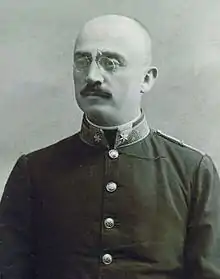Risto Savin
Risto Savin (Žalec, 1858 – Zagreb, 1948), born Friderik Širca, was a Slovenian composer. He is one of the composers credited with creating a Slovenian national tradition of opera.[1]

Risto Savin
Risto Savin was a pseudonym adopted by Friderik Širca, a general in the army.[2] He studied composition with Robert Fuchs in Vienna and became notable as one of the composers of Slovenian-language opera. His opera Lepa Vida (Lovely Vida, 1907) is one of the Slovenian operas to show the influence of Wagner.[3] The house where Risto Savin was born in Žalec is now a museum.
Works
Operas
- Poslednja straža (Last Watch, 1898)
- Lepa Vida (Pretty Vida, 1907)
- Gosposvetski sen (1921)
- Matija Gubec (1923)
Ballets
- Plesna legendica (1918)
- Čajna punčka (The Tea Girl, 1922)
Songs
- "Pismo" (The Letter, Oton Župančič)
- "To je tako" (Oton Župančič)
- "Svetla noč" (Oton Župančič)
- "Marica" (Oton Župančič)
- "Ljubica, zdaj je dan" (Anton Aškerc)
Selected recordings
- Music for cello and piano Grieg, Savin, Martinu, Pucihar Nikolaj Sajko and pianist Miha Haas.
References
- Hindley, Geoffrey. 1994. Larousse Encyclopedia of Music, p. 576 "Davorin Jenko (1835-1914) is considered as the founder of Slovene national music; Risto Savin (1859-1948) created a national tradition of opera"
- Cvetko, Dragotin. 1967. Histoire de la musique Slovène. "Le premier de cette génération fut Risto Savin, dont le vrai nom était Friderik Širca (1858 — 1948). Il fut officier de profession et il obtint le grade de général. Il étudia la composition chez Robert Fuchs à Vienne."
- Jim Samson Cambridge History of Music 2001 "Slovenian composers well into the twentieth century developed a cosmopolitan late Romantic idiom influenced by Brahms and Dvorak and occasionally, as in Risto Savin's 1907 opera Lepa Vida (Lovely Vida), by Wagner"
This article is issued from Wikipedia. The text is licensed under Creative Commons - Attribution - Sharealike. Additional terms may apply for the media files.